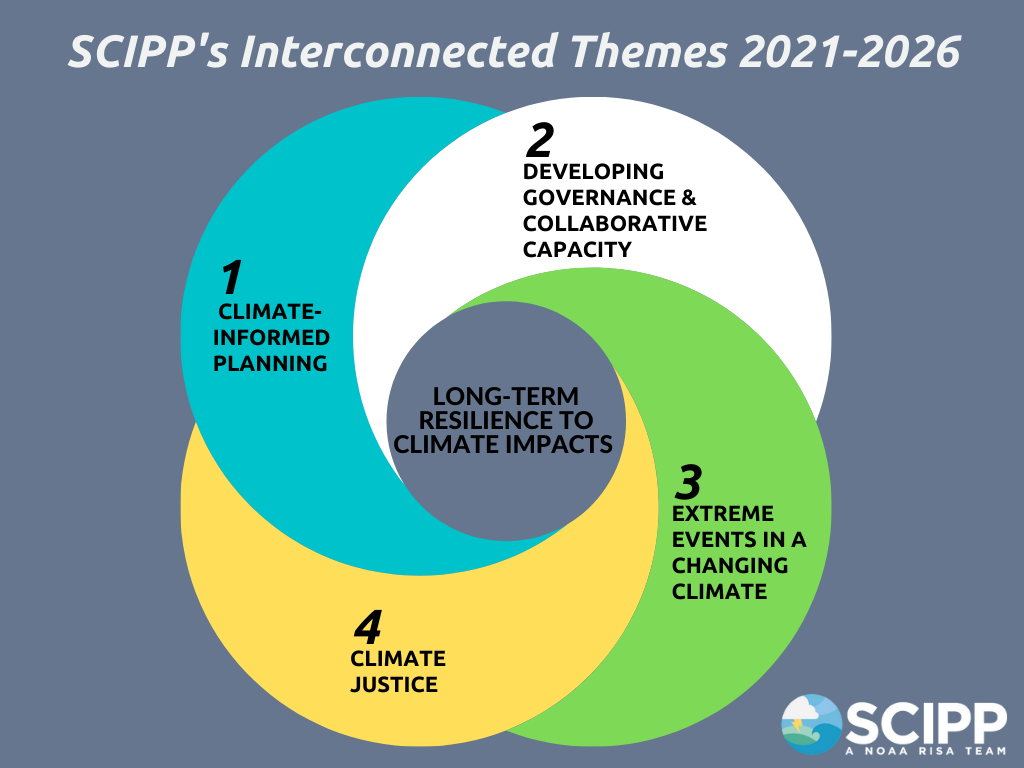The Southern Climate Impacts Planning Program is pleased to announce that it has received funding for the next five years for its project entitled, “Planning for Long Term Change in a Short Term World.” The team successfully competed for NOAA funding from the Regional Integrated Sciences and Assessments program in the Climate Program Office and will receive $5.4 million over the five year award, contingent on congressional appropriations. SCIPP began in 2008 and is entering its fourth phase. The team is led by the University of Oklahoma and includes previous partners Louisiana State University and Texas Sea Grant at Texas A&M University. A new partner in phase IV is Adaptation International. Although Adaptation International is a new member of the SCIPP team in a formal capacity, the Austin, Texas-based company has collaborated with SCIPP on several projects over the years.
SCIPP’s mission is to assist organizations with making decisions that build resilience by collaboratively producing research, tools, and knowledge that reduce weather and climate risks and impacts across the South Central United States, which includes Oklahoma, Texas, Arkansas and Louisiana. To do so, SCIPP engages with stakeholders to identify specific ways in which their plans and operations are impacted by extreme events and connects them to relevant and actionable climate information that can inform their planning and decision-making processes. Where possible, deeper interactions are identified that can result in co-production of new knowledge or tools.
“This funding will enable us to continue to collaborate with decision makers in the region and advance research that helps communities reduce the impact of their climate-related challenges,” said SCIPP Director Rachel Riley. “The interdisciplinary and stakeholder-driven nature of the project is a unique arrangement that allows us to build truly impactful partnerships and knowledge.”
In recent years, the team has made physical science advancements such as understanding changes in hourly precipitation, extreme heat in Louisiana, and wildfire impacts on the Southern Plains. Social scientific advancements and engagement led to understanding how knowledge management practices can enhance the use of science in decision making, the utility of a climate decision support tool, how previously flood-prone Tulsa, Oklahoma succeeded in mitigating the hazard, and understanding the climate-related needs of small- to medium-sized Gulf Coast water utilities. In addition to academic publications, SCIPP researchers and engagement specialists have contributed to local and state planning documents, working groups, workshops, and developed online tools.
Four themes will be the focus of the project during 2021-2026: climate-informed planning, developing governance and collaborative capacity, extreme events in a changing climate, and climate justice. Together, the themes are designed to help communities and states become more resilient to climate-related challenges. Learning how to incorporate climate information effectively into long-term plans opens opportunities for mitigating climate impacts. Recognizing the financial and policy levers available to communities reveals how disasters can become sources of future resilience. Understanding how climate change may affect the frequency and intensity of events equips communities with foresight and preparedness. Climate justice assures that all members of communities have a voice in policies and activities taken to lessen the impacts of future events.
For more information, visit www.southernclimate.org or follow SCIPP on Twitter at @SCIPP_RISA and Facebook at @SouthernClimateImpactsPlanningProgram.

